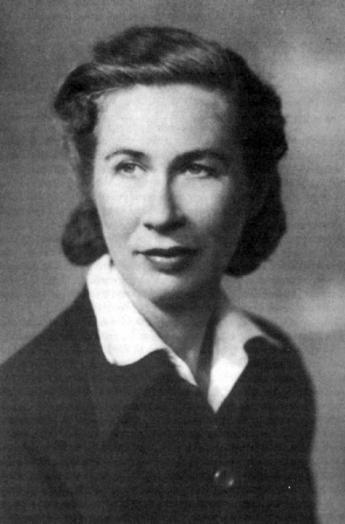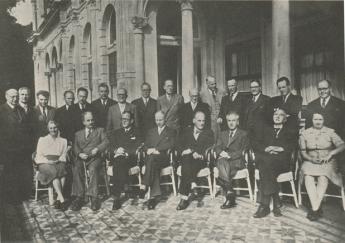From the ILAB Archives: Amsterdam 1947 - A Bookseller's Wife Looks at Her Diary

By Barbara Kaye Muir
In 1977, the 24th ILAB Congress and 7th ILAB International Antiquarian Book Fair took place in Düsseldorf, Germany. On this occasion, Karl H. Pressler, former editor of the German booksellers’ magazine “Aus dem Antiquariat”, published a special issue with articles about the League and its history written by representatives of the international rare book trade such as Menno Hertzberger, Helmuth Domizlaff, Percy H. Muir, Georges A. Deny, Dr. Lotte Roth-Wölfle, Stanley Crowe, and Barbara Kaye Muir.
The wife of Percy H. Muir, a celebrated author, accompanied her husband to many congresses and meetings from the beginnings in 1947 up to the 1960s. Some of her memoirs were published in her books “Second Impression” and “The Company We Kept”, published by Oak Knoll Press and Werner Shaw Ltd. In 1947 Barbara Kaye Muir joined her husband Percy on his trip to the Preliminary Conference in Amsterdam where the Presidents of the ten founding associations of the League came together on invitation of Menno Hertzberger. She witnessed the official discussions and talks behind the scenes along with the life and economic situation in Post War Amsterdam - and she received a lesson in drinking Dutch Genever.
Towards the end of August PHM (Percy H. Muir) told me that he must go to Amsterdam in September, to attend a conference organised by the Dutch Antiquarian Booksellers Association with the aim of forming an international trade association. As ABA president he had been asked to take the chair. France, and the three Scandinavian countries would also be taking part.
»I'd like you to come too, if you can get away,« he said.
It was ten years since I'd been out of the U.K. I was longing to travel again and I'd never been to Amsterdam. It was a chance not to be missed; but it would be term time so the only way was to find someone to move in and look after the children in my absence. I began a determined search at once and struck lucky. A nice, reliable woman who had worked former temporarily, agreed to oblige. The widow of a jockey she took a fancy to our diminutive son and urged me to let him train for a career on the turf - »he'd make a lovely little jockey, Mrs. Muir«. At the same time Elkin Mathews was able to add another member to the staff, who would take the Clique reports off my hands.
We set off on the evening of September 16th, travelling on the boat train to Harwich with Harold Edwards of Newbury (PHM's oldest friend in the book trade) and his attractive wife Olive who worked with him in the business. Although PHM knew that this could be a tough assignment it was grand to be crossing the Channel once again and we were all in holiday spirits. It had been arranged that we should be joining in Amsterdam Winnie Myers, a London bookseller and autograph dealer, and Stanley Sawyer and his sister, who had a bookshop in Grafton Street.
Our British delegation were warm supporters of the Dutch proposal, but this couldn't be said of some other members of the ABA who, with tiresome insularity, were insisting that they couldn't see the need for an international association, since foreign booksellers could become members of the ABA.
When our train drew in to Amsterdam station the next morning Menno Hertzberger, the president of the Dutch Association, was on the platform to greet us, a small, wiry figure full of nervous energy. He looked, I thought, worried. But then he had some reason to be. The conference was his idea and to organize such an event in Holland in 1947 must have taken some doing.
Through the League I came to know Menno well. He always welcomed PHM and me warmly when we came to Holland and was a generous host to us on many occasions. That morning, speaking fluent English, he hurried us off to the Pays Bas Hotel, briefing Harold and PHM on the arrangements for the Conference as we went.
Amsterdam delighted me. I thought it not only a beautiful city - with its fine old merchant houses, gazing down at their reflection in the canals - but dignified and orderly as well; not adjectives that can be applied to many beautiful cities. The bicycle seemed more ubiquitous than the motorcar and the hippie infestation was yet to come. As in England things were in short supply, but not flowers. One saw them everywhere, in the street markets, blooming in window boxes, growing healthily in pots in the wide windows of apartment blocks.
Dora and Menno Hertzberger entertained us at their home that first evening and we swapped stories of post-war problems, all too aware that we had come off very lightly compared with the Dutch. The next morning we awoke to the sound of music. When we looked out of our window there, serenading us, was one of Amsterdam's traditional rococo street organs - a one-man-band on wheels.
While the conference was in session Olive and I went shopping. We'd been invited to coffee by Dora Hertzberger and advised which tram-car to take. Jumping aboard we realized at once we'd committed some sort of crime. The conductor shouted at us angrily, several passengers chimed in.
»We're English, we pleaded, anxious to stay aboard. »We don't understand! «
Instantly the angry looks changed to smiles. The conductor shook hands with us, someone insisted on paying our fares. What we had done was to board the tram at the wrong end. In those days the English could be forgiven anything.
The hospitable Dutch did us proud during those three days of the first Conference. They took us for a trip around the canals and the harbour, they drove us out for a tour of the countryside and gave us dinner at a country club, and on the second evening we were given a banquet at the Vondel Park Pavillion.
I've nothing against banquets so long as I don't have to make a speech, or sit next to someone who has been asked to do so. If it's the first case I'm too frightened to enjoy my dinner, if it's the second I know my chatty conversation is going to be received either with gloom or inattention.
At the Dutch banquet I found myself beside the Mayor of Amsterdam. He was a charming and attractive man and I was delighted to discover he had no intention of making a speech. It was a five course banquet starting with Hors d'oeuvres, followed by Creme de Volaille, Truite Bleu du Lac, Noisettes de Veau and Glace Fantasie - plenty of time to improve my acquaintance with the Mayor.
No one had thought to tell me that in Holland oratory takes (precedence) to gastronomy so that when, almost before my soup plate had been whisked away PHM stood up and announced that Mynheer So-and-so would address us I couldn't believe that the speeches had actually begun. The gentleman must surely be going to make some important announcement that couldn't wait until the meal was over. A royal death? A Russian invasion?
The Dutchman was speaking in his own language so I couldn't understand a word. I glanced at the Mayor, he seemed unperturbed. Presently the speaker sat down to applause and was immediately followed by another of his fellow countrymen, also speaking in Dutch. As PHM has related elsewhere the rest of the meal followed the same pattern. With my ears filled with a flow of incomprehensible words I couldn't help thinking how nice it would be if the League that was, hopefully, to be formed, would persuade its members to start learning Esperanto.
Some time before the end of the meal the Mayor excused himself and slipped away - to attend another function he explained. It was a shame, we'd hardly exchanged a word and I never met him again.
Amongst the names scrawled on my treasured menu of this first international conference banquet is that of Einar Gronholt-Pedersen, who as President of the Danish association, was to be our host at the Copenhagen Conference the following year. Our friendship with this tall, friendly Dane has continued warmly over the years. His zest for life and his tremendous sense of fun was better than a tonic and made many a tedious function bearable. With Einar around one could never be bored.
After the banquet we were carried off to a night club. Of the rest of the evening all I can remember is being taught all about Dutch gin.
»You must drink only Bols and you will feel fine in the morning. No you must not put in anything. You must drink it as it is - like this. 'It is very good for you. Cheers!«
On our last evening, with the Conference successfully concluded, the British celebrated on their own at the Pays Bas. It was Saturday night and there was music in the restaurant - a woman pianist and a male violinist. Our presence had been noticed and towards the end of our dinner they struck up »A Bicycle Made for Two«. PHM started to hum and the rest of us joined in; soon we were belting out »Down at the Old Bull and Bush«. Dutch diners at the other tables smiled to see the British so uninhibited. Then a waiter brought a note to PHM. Would he sing a solo?
»Ask the pianist if she can play the >Old Folks at Home<«, he said.
Certainly she could. Married to a Hungarian she had been away from London for thirty years, but she was still a Cockney.
So PHM sung »Old Folks at Home« in his pleasant baritone, the pianist wiped away a tear and then we all went to bed.
We were rather less happy the next day as the ferry ploughed its way back to Harwich through a choppy grey sea, but our wan looks awoke no sympathy in the hearts of the British Customs officers. They opened up our suitcases, my handbag was taken from me and searched. What were they looking for? Diamonds? Drugs? All we had brought back from Holland was Dutch gin and some happy memories.
Ahead stretched a vista of conferences and committee meetings in European cities, with generous hospitality and warm friendships to be made along the way. Mercifully we weren't able to foresee all the attendant problems and headaches.
(Published in Aus dem Antiquariat 9, 1977. Presented here by permission of the Börsenverein des Deutschen Buchhandels.)

